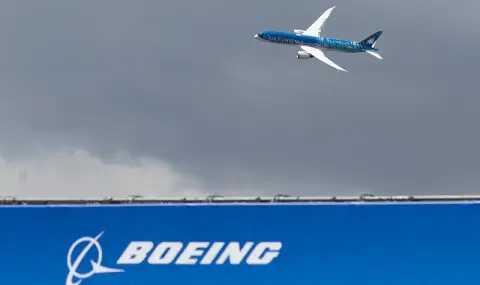A Boeing plane destined for a Chinese airline landed back at the aircraft manufacturer's US production center on Sunday after traveling 8,000 km. The reason is most likely related to President Donald Trump's decision to raise tariffs on Chinese goods imported into the US to 145 percent, in response to which China imposed a 125 percent tariff on US goods, Reuters reported.
The 737 MAX plane, which was intended for the Chinese airline Xiamen Airlines, landed at Boeing Field (Boeing Field) in Seattle at 01:11 GMT. This is the latest sign of disruption in the supply of new aircraft, the reason for which is the violation of the decade-old duty-free status of the aerospace industry, commented Reuters. The tariff war between the United States and China and the turnaround related to the deliveries of "Boeing" come at a time when the American company is recovering from a nearly five-year freeze on the import of 737 MAX aircraft, the British agency added.
According to the aviation information service "Air Current" (Air Current) in the middle of this month, three 737 MAX aircraft were returned to the United States, which were originally prepared for delivery to two Chinese airlines at the center of "Boeing" in Zhoushan, reported "Fox News". According to official Boeing data published by Airways magazine, as of the end of March, there were planned deliveries of 130 aircraft to Chinese companies.
China is the world's largest market for purchasing aircraft, and according to a recent Boeing analysis, Chinese airlines are expected to purchase 8,830 new aircraft over the next 20 years, adds the American news site Business Insider.
Last week, Bloomberg reported that authorities in Beijing had ordered Chinese airlines to stop deliveries of Boeing aircraft and parts for them.
The Chinese "just abandoned a major deal with Boeing," saying they "will not take possession" of the "of the planes that are fully ready for delivery," Trump wrote a little later on the social network "Truth Social."
These measures by the Chinese government come in response to Washington's decision to raise tariffs on Chinese goods imported into the United States to 145 percent, Reuters points out. In response to the new tariffs introduced by the United States, China imposed a 125 percent tariff on imports of American goods. Meanwhile, Trump has softened his customs policy by granting temporary exemptions from customs duties on some electronic devices, including smartphones, computers, etc. A large part of these devices are manufactured in China, the British agency recalls.
China is an important market for "Boeing," which has been recovering from a series of financial losses and reputational shocks in the past year, notes "Business Insider." Any supply restrictions would affect the company's market share, which competes with European giant "Airbus" and some new players on the market, the media outlet also wrote.
The suspension of deliveries of American aircraft to China would be a blow not only to "Boeing", but also to the entire American economy, CNN commented. Unlike many multinational companies, "Boeing" produces all of its aircraft in factories in the United States and sells almost two-thirds of its passenger aircraft abroad. "Boeing"'s contribution to the American economy is estimated at $79 billion. The company has nearly 150,000 of its own employees in the United States and also indirectly provides another 1.6 million jobs, the American television added.
"Boeing" has been struggling for six years, and since 2018 – The last year it reported an annual profit, the company incurred operating losses of $51 billion. The company's shares have fallen 8.5 percent this year.
To offer its airlines an alternative supplier, the Chinese government is investing tens of billions of dollars in Shanghai-based aircraft manufacturer "Commercial Aircraft Corporation of China" (Commac), the American newspaper "Wall Street Journal" notes. If China continues to stop buying Boeing aircraft, this could also negatively affect "Commac" before the company becomes globally competitive, the publication predicts.
According to data from the International Trade Administration, last year the United States exported nearly $12 billion worth of aircraft, spacecraft and parts to China. dollars, and they have contributed almost nothing.
With relations between the US and China rapidly deteriorating, imposing new high tariffs on the multi-billion dollar aviation sector could lead to serious problems for both economies, concludes the "Wall Street Journal".
